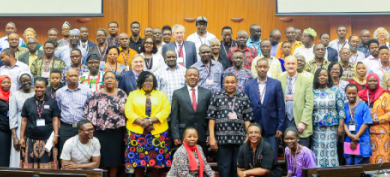CCAB releases report on Indigenous businesses
By Julia Magsombol
Local Journalism Initiative
[email protected]
On October 19, the Canadian Council for Aboriginal Business (CCAB) and Global Affairs Canada (GAC) released a report regarding Indigenous businesses, with a focus on exporters — including the challenges they face and the potential success they can achieve in the future.
“We’re very excited about that and the opportunity to paint the most complete picture of Indigenous business export experiences. It’s a portrait of Indigenous exporters, including their characteristics and the export markets of interest for them,” said Matthew Foss, the vice-president of Research and Public Policy for CCAB.
Foss noted there are many challenges facing Indigenous businesses today, adding there is little information about them that helps people understand the importance of a prosperous Indigenous economy and how this supports Canada’s economy.
“I think that hurts their opportunities with respect to export and trade,” Foss said.
He also explained that, unfortunately, Indigenous businesses are less likely to be exporters than the average Canadian businesses. Most of the Indigenous businesses that are in remote areas struggle more to be exporters through the urban-rural differentiation.
Similar to other Canadian exporters, the United States and Europe are key markets of interest; however, for Indigenous exporters, there is a much greater emphasis placed on Australia as opposed to markets in Asia.
Foss stated their goal through this report is to recognize this situation.
“We believe in Indigenous businesses. We want to see them thrive and fill that space and move towards economic reconciliation,” he explained.
Despite these challenges, Foss continues to focus on the good side.
“One of the most prominent features that I like to talk about is the fact that Indigenous women are leading.”
The Indigenous economy is just as diverse as the rest of the Canadian economy. Indigenous businesses are involved in manufacturing, natural resources, engineering, consulting, trade, warehousing, transportation, software technology, and more.
“My role is to see Indigenous entrepreneurs succeed — to see a seed in their self-determination, ownership, and control,” Foss added.
He explained that Indigenous businesses are very significant as this may be one of the paths to empowerment and can lead the way to strong communities with economic prospects and prosperity.
Many communities can help them by purchasing directly from them and supporting different small businesses.
“Just that small change in buying habits would facilitate the commercial movement, as well as the individual movement,” Foss said. “Every time an Indigenous business succeeds, they become more empowered to grow their business and reach internationally as well as domestically.”
Foss is hoping to see more Indigenous entrepreneurs grow and succeed.
“Indigenous Peoples and entrepreneurs are very resilient and are finding a way, despite all these challenges, and hopefully helping to advocate to overcome some of the other challenges,” he said.
For information on another report releasing soon, visit https://www.ccab.com/indigenous_export-2/.





